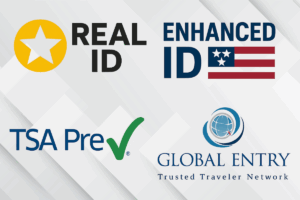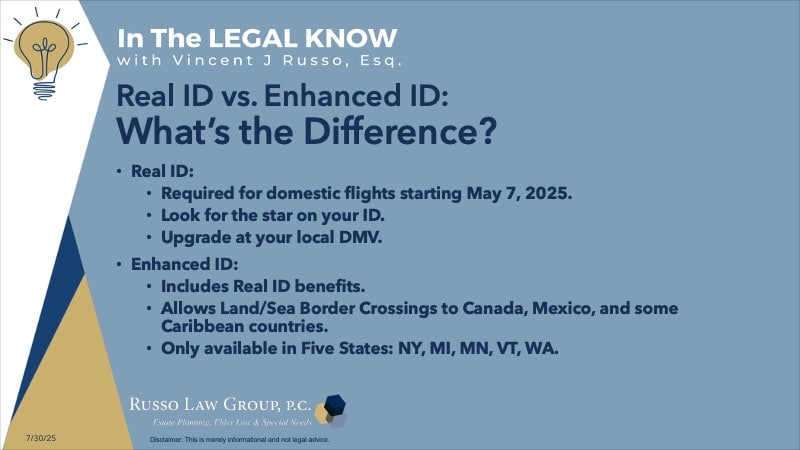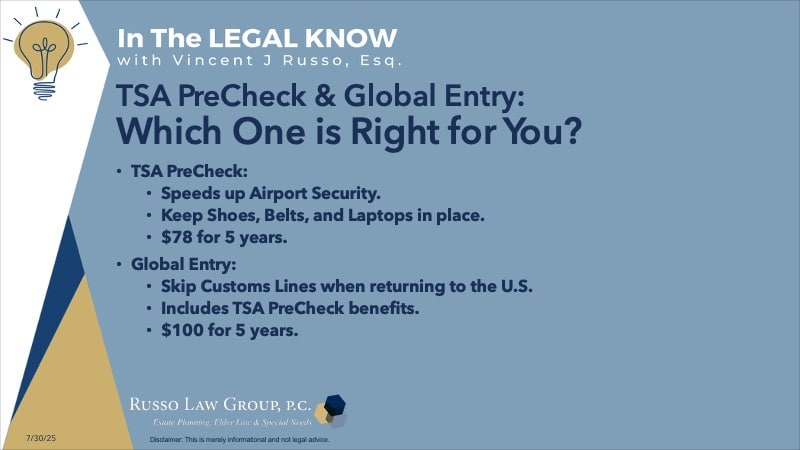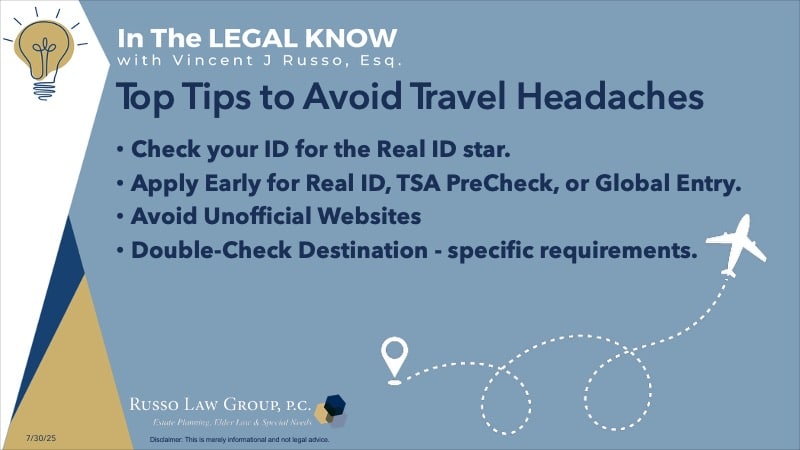Delve into the significance of resolutions, their origins, and actionable advice for making meaningful life improvements this year.
Confused about what you need to fly? What’s the deal with Real ID, Enhanced ID, TSA PreCheck, and Global Entry? Let’s clear up some of the confusion for a stress free journey. Life is complicated and over the last decade or so, traveling has become more complicated.
This originally aired on the Catholic Faith Network’s show CFN Live: https://youtu.be/xgoTj8Gj29o
What exactly is the Real ID, and why is it such a big deal for travelers?

Starting May 7, 2025, you’ll need a Real ID-compliant license or another acceptable form of identification, like a passport, to board domestic flights or enter certain federal facilities.
You can tell if your ID is Real ID-compliant by looking for a star in the upper corner of your driver’s license or state ID. If you don’t see that star, it’s time to visit your local DMV to upgrade. The process can take some time, so I recommend checking your ID now and making an appointment sooner rather than later. The last thing you want is to show up at the airport and be turned away because your ID doesn’t meet the requirements.”
What’s the difference between a Real ID and an Enhanced ID? Are they interchangeable?
That’s a common point of confusion; while both Real ID and Enhanced ID are federally compliant forms of identification, they serve slightly different purposes.
A Real ID is primarily for domestic air travel and accessing federal facilities.
An Enhanced ID, on the other hand, goes a step further. It can also be used for land and sea border crossings to Canada, Mexico, and some Caribbean countries, in addition to domestic air travel.
However, not all states offer Enhanced IDs. Currently, they’re only available in five states (New York, Michigan, Minnesota, Vermont, and Washington). If your state offers it and you frequently travel to Canada or Mexico by car or ferry, an Enhanced ID might be a good option for you. But keep in mind, it’s not a substitute for a passport if you’re flying internationally.”
What if I don’t have a driver’s license so I don’t have a compliant Real-ID, what do I do?
For those who do not have a driver’s license, you will need to have a state issued non-driver Real-ID. If you do not have one, you will need to apply for one, in person, at your local DMV. Before you go, make sure you have the documents that will be required by the DMV (such as proof of identity, date of birth, and residency).
A U.S. passport or passport card will always allow you to travel, domestically or internationally.
Who should consider applying for TSA PreCheck and Global Entry?
Both TSA PreCheck and Global Entry are excellent programs for frequent travelers, but they serve slightly different purposes.
TSA PreCheck is all about making your airport security experience faster and less stressful. With TSA PreCheck, you can use dedicated security lanes, keep your shoes and belt on, and leave your laptop and liquids in your bag. It’s available at over 200 airports in the U.S., and the application process involves a background check and an in-person appointment. It costs $78 for five years, which is a great value if you fly often.
Global Entry, on the other hand, is designed for international travelers. It allows you to skip the long customs lines when you return to the U.S. Instead, you use a kiosk to scan your passport and fingerprints, answer a few questions, and you’re on your way.
The best part? Global Entry includes TSA PreCheck, so you get the benefits of both programs. It costs $100 for five years, and the application process is similar but includes an interview with U.S. Customs and Border Protection. If you travel internationally even once or twice a year, Global Entry is worth considering.”
What are some common mistakes or traps travelers fall into when navigating these options?
- One of the biggest mistakes is waiting until the last minute to apply for a Real ID or Enhanced ID. Prior to the May 2025 deadline, there were long waiting times at the DMVs and getting a timely appointment in certain locations was difficult.
- Another common trap is assuming that an Enhanced ID is available in every state—it’s not, so you’ll need to check with your local DMV.
- When it comes to TSA PreCheck and Global Entry, a lot of people forget to renew their memberships on time. Both programs send reminders, but if you miss them, you could find yourself stuck in long lines at the airport.
- Another trap is falling for scams. There are unofficial websites that charge extra fees to help you apply for these programs. Always go directly to the official TSA or U.S. Customs and Border Protection websites to apply.
- And finally, some travelers assume that having TSA PreCheck or Global Entry means they don’t need a Real ID or passport—that’s not the case. These programs are great for convenience, but they don’t replace the required forms of identification.”
How can travelers ensure they’re prepared to avoid any last-minute surprises at the airport?
Plan ahead and stay informed!
Start by checking your ID today—does it have the Real ID star? If not, make an appointment at the DMV as soon as possible. If you’re considering TSA PreCheck or Global Entry, apply well in advance of your next trip, as the approval process can take several weeks.
Also, keep track of expiration dates for your ID, passport, and any travel programs you’re enrolled in. Set calendar reminders so you don’t miss renewals.
And finally, always double-check the requirements for your specific destination. For example, some countries require your passport to be valid for six months beyond your travel dates.
A little preparation goes a long way in avoiding unnecessary stress and ensuring a smooth travel experience.
If you would like to speak with an experienced elder law attorney regarding your situation or have questions about something you have read, please do not hesitate to contact our office at 1 (800) 680-1717. We look forward to the opportunity to work with you.
Disclaimer: The information provided above is for general informational purposes only and is not legal advice.







Comments (0)